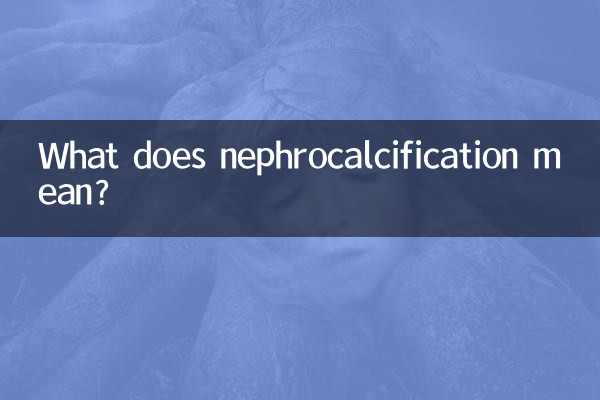What does nephrocalcification mean?
Nephrocalcification is a common medical phenomenon that refers to the deposition of calcium salts in kidney tissue. This phenomenon may be related to a variety of diseases or physiological conditions, and is usually discovered through imaging examinations (such as B-ultrasound, CT, etc.). In recent years, with the improvement of health awareness, renal calcification has become one of the hot topics. This article will combine the hot content on the Internet in the past 10 days to provide you with a detailed analysis of the meaning, causes, symptoms and countermeasures of renal calcification.
1. Definition and classification of renal calcification

Nephrocalcification refers to the abnormal deposition of calcium salts in kidney tissue and is usually divided into the following two categories:
| type | Features | Common causes |
|---|---|---|
| Physiological calcification | No clear pathological significance, may be related to age | Aging, mild metabolic abnormalities |
| pathological calcification | Concomitant diseases or functional abnormalities | Kidney stones, infections, tumors, metabolic diseases (such as hypercalcemia) |
2. Common causes of renal calcification
According to recent medical research and clinical data, the main causes of renal calcification include:
| Ranking | reason | Proportion |
|---|---|---|
| 1 | kidney or urinary tract stones | about 35% |
| 2 | Metabolic abnormalities (such as hypercalcemia) | about 25% |
| 3 | chronic kidney disease | about 20% |
| 4 | infection or inflammation | about 15% |
| 5 | Others (such as tumors, genetic factors) | about 5% |
3. Symptoms of renal calcification
Most patients with mild nephrocalcinosis have no obvious symptoms and are usually discovered incidentally during physical examination. However, if the calcification is severe or accompanied by other diseases, the following symptoms may occur:
1.lower back pain: Unilateral or bilateral waist pain or dull pain, which may be related to stones or infection.
2.hematuria: Urine that is light red or watery indicates the possible presence of stones or kidney damage.
3.Frequent urination and urgency: If combined with urinary tract infection, urinary discomfort may occur.
4.fever: Systemic symptoms may occur in severe infections.
4. Diagnosis and treatment suggestions
Recent medical guidelines recommend the following examination procedures:
| Check items | Purpose | Remark |
|---|---|---|
| B-ultrasound | Initial screening for calcifications | No radiation, suitable for pregnant women and children |
| CT scan | Identify the location and extent of calcification | Gold standard, but be careful about radiation |
| Urinalysis | Detect hematuria, proteinuria, etc. | Assist in determining the cause of disease |
| blood test | Assess renal function and calcium metabolism | Including blood calcium, blood phosphorus, PTH, etc. |
5. Prevention and life adjustment
Based on recent health science hot spots, key measures to prevent renal calcification include:
1.drink more water: It is recommended to drink 1.5-2 liters of water per day to reduce urine concentration.
2.low salt diet: Controlling sodium intake can reduce urinary calcium excretion.
3.Appropriate amount of calcium supplement: Avoid excessive calcium supplementation (especially health supplements) and give priority to dietary intake.
4.Regular physical examination: People over 40 years old are recommended to have a urinary system B-ultrasound once a year.
6. Answers to hotly discussed questions among netizens
Based on social platform data in the past 10 days, we have compiled high-frequency questions:
| question | Professional answers |
|---|---|
| Can renal calcification become cancerous? | Simple calcification rarely becomes cancerous, but tumor calcification needs to be ruled out |
| Is surgery needed? | Most do not require surgery unless there is stone obstruction or infection |
| Can calcification disappear on its own? | Calcification that has already formed is usually irreversible, but worsening can be prevented |
Conclusion
As a common imaging finding, renal calcification may be a harmless physiological phenomenon or may indicate an underlying disease. Through scientific cognition and normative inspection, unnecessary anxiety can be avoided. If renal calcification is found, it is recommended to seek medical evaluation promptly and develop a personalized management plan. Recent studies have shown that early intervention can significantly improve prognosis and that a healthy lifestyle is a key preventive measure.

check the details

check the details